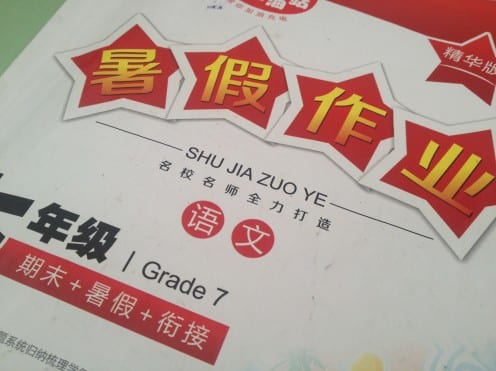QQ and education: children, parents, and schools and communication in China
By Tom McDonald, on 22 August 2013

Chinese textbook entitled ‘Summer Holiday Homework’ used by a middle school student in the North China fieldsite (Photo by Tom McDonald)
In the North China fieldsite, education makes a really neat contrast with Xinyuan’s case that she outlined in her earlier blog post, where she described how the migrant factory workers in her South China fieldsite often seemed to be having children specifically with the objective of sending them to factories at the earliest possible age.
The situation could not be more different here in North China, where education has presented itself as being an overwhelming priority for parents. Although people in the town and the surrounding villages are not in excruciating poverty, they are also by no means wealthy. Nonetheless, doing whatever they can to make sure that their child gets the best education seems to be at the front of parent’s minds. For example, here the summer holidays are not turned over the children’s play, as one may expect. Instead, many children attend tutoring classes (fudao ban). Most of the tutoring classes follow the normal school times of 8-11:30am and 2:30-5:30pm, except they take place an astonishing seven days a week.
Given the importance of educational achievement that parents place on their children, social media seems to play a role that would be best defined as somewhat antagonistic and contradictory to these educational aims. There is a discourse around QQ in the town that assumes it to be bad, and particularly threatening to children’s educational achievement of young people, and so it requires access to be restricted. This is then weighed against more practical benefits offered by the services that mean that they are in fact used by many student, parents and teachers alike.
One of the most common statements that emerged was that parents said their middle school children did not have QQ accounts or mobile phones. Almost every parent of children who did not have QQ or a phone would say ‘it affects study’ (yingxiang xuexi) as the reason for their children not having access to certain types of communication. For example, Mr Li bought a computer in the year 2003 when he was trying to make a go of his photography business. At this time Mr Li’s daughter was about 7 years old. Mr Li decided to setup a QQ account for his daughter. He saw that she was using it a lot and became worried she was playing too much, so he tried encourage his daughter to limit her own use, threatening to change the password if she did not comply. After two days Mr Li went to change the password, and realised it had already been changed. His daughter maintained that she hadn’t changed the password herself, saying to her father ‘hey, how can I not login?’. From this event Mr Li explained that he realised that young people caught on to new technologies very quickly.
Schools themselves also present a somewhat mixed set of messages regarding the use of social networking. Most obviously, the school rules prohibit the use of mobile phones. The reality is, of course, somewhat different. According to one middle school teacher, in a class of around 40 students, one might expect to find around 11 with telephones on their person. The most important reason for confiscating phones is the use of playing online games on phones or using it to send messages via QQ.
On the other hand, there were also examples of cases where schools had been incredibly pro-active in the creation of accounts. One parent explained their main reason for having a QQ account themselves was to hear from the school:
“I do not normally use QQ chat, I mainly use it for communicating with my child’s primary school teachers. My child has just started the second year of primary school, from the start of the first year, if teachers have some materials they just post it all on QQ, and you download it yourself.”
The final interesting twist to this story is that all this parental effort aimed at restricting young people’s access to QQ and mobiles is effectively then reversed when, at the relatively tender age of 15, most children leave home to read vocational college or high school in the nearby city district, about 20km away. This event changes a major part of parent’s views towards communication and it becomes more common for parents to condone the use of QQ or mobiles.
For example, Liu Ting has just finished her middle school examination, and has also managed to secure a place in the top high school in the nearby city. As a reward (jiangli) for her excellent results, her parents said they were going to give her 1000 RMB ($163 USD) cash. However her mother told us that Liu Ting said it was too much, so they came to a compromise of a 500 RMB ($81 USD) reward and a mobile phone for her to use when she started school in the city. Previously she had not been allowed the use of a phone.
These three quite contradictory examples all show different degrees of restriction or condoning of QQ and phone use, and reveal the nuances of shifting relationships between children parents and schools in China.
 Close
Close




